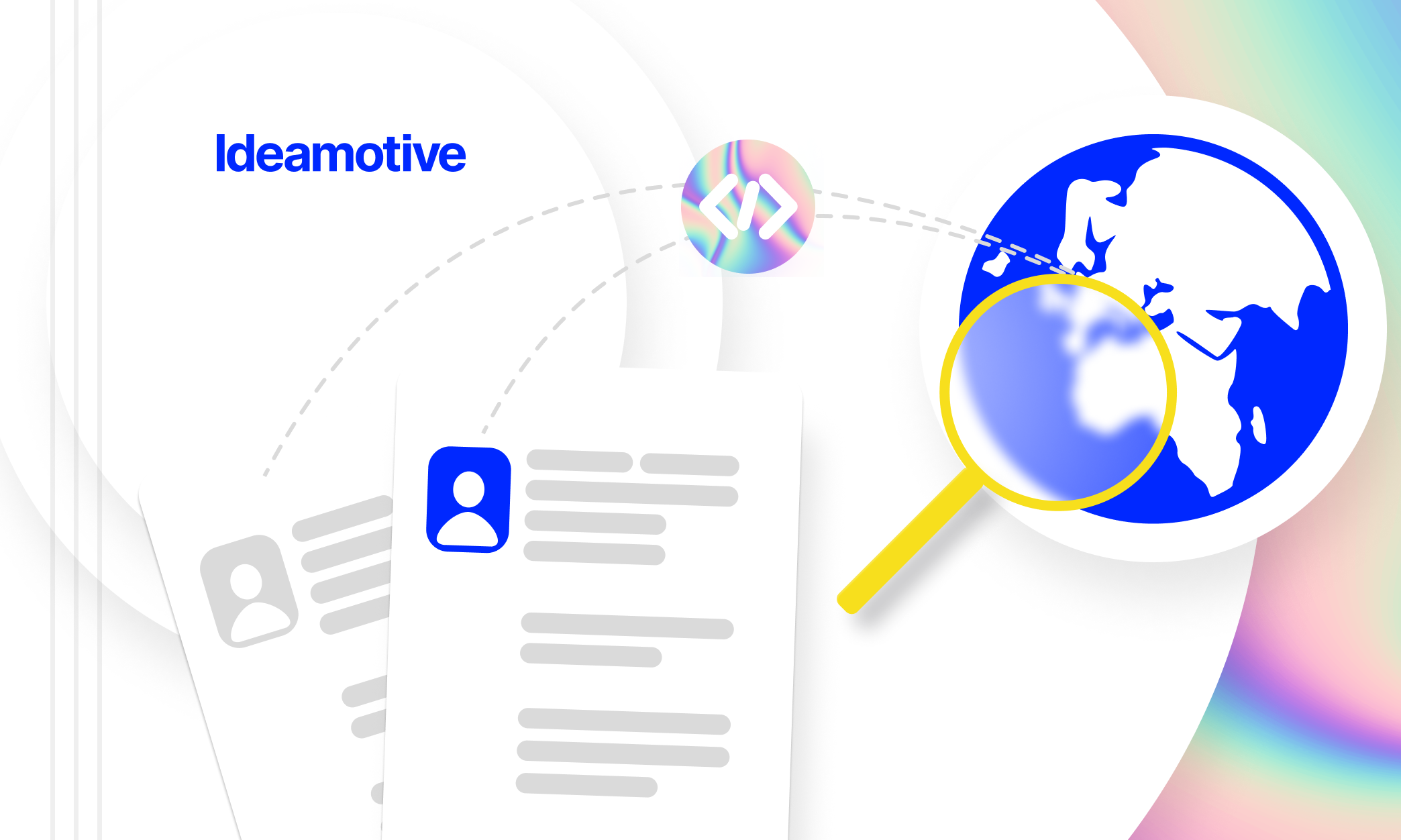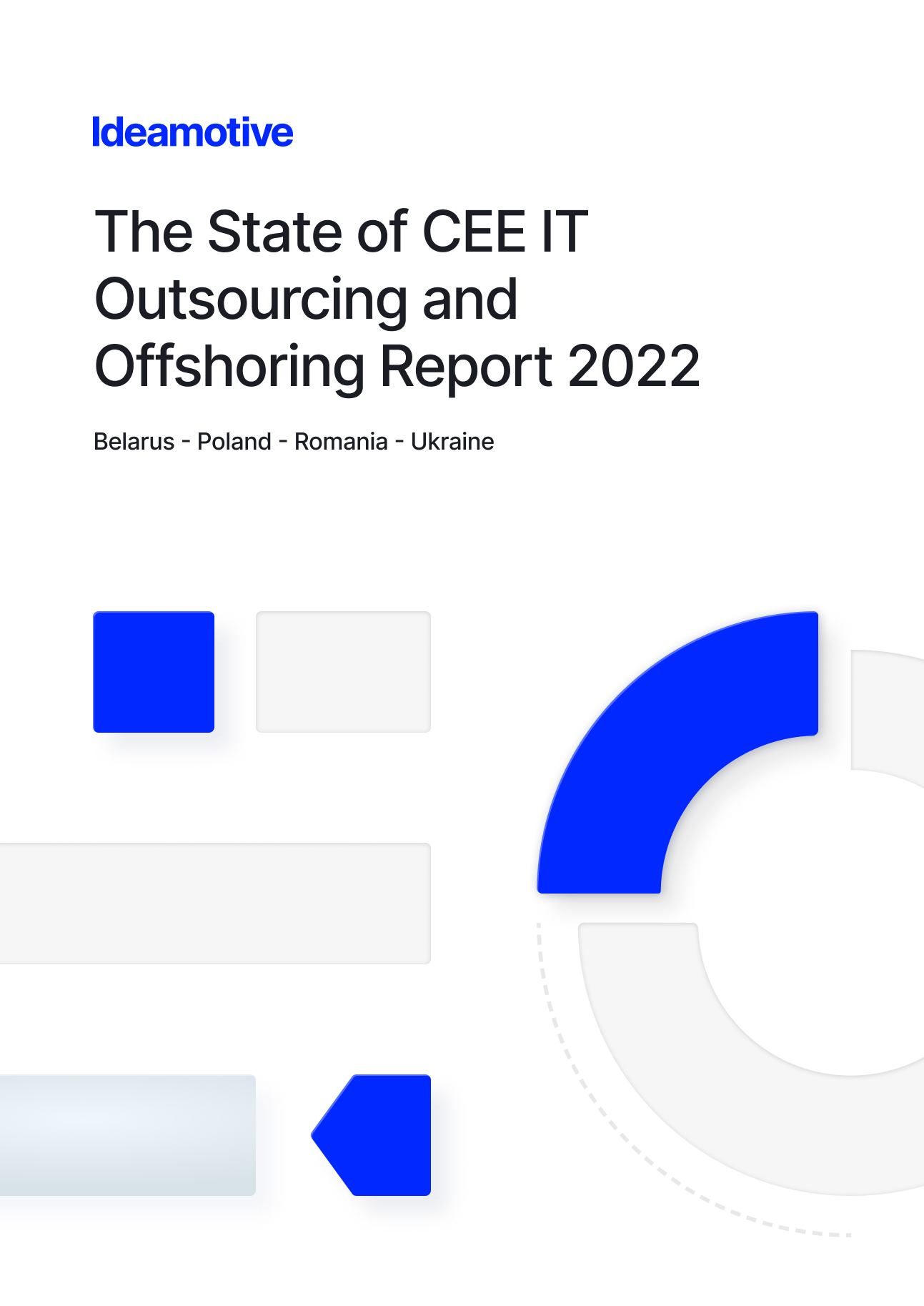The robust advent of Industry 4.0 has not only revolutionized our everyday practices and shop floor activities. It has also radically transformed the global labor market, causing the extinction of some walks of life and ushering in new ones. Blockchain engineer is among those professions that came to the forefront with the appearance of this know-how and is sure to be in ever-greater demand in the high-tech-powered world of the 21st century. What is the explanation behind this nascent but potentially powerful upward trend?
Zooming in on the Current State of Blockchain
As a manager of a digitally-powered enterprise, you may think: “Well, I’m not going to mine Bitcoins or integrate a crypto wallet into my payment gateways. So why bother to hunt high and low for a blockchain specialist and pay through the nose for their services?” Such a train of thought is grounded on the widespread misconception that equates blockchain technology with cryptocurrency. Whereas financial initiatives account for about a third of the blockchain market value, this technology finds broad application in other fields as well, not necessarily related to finances.
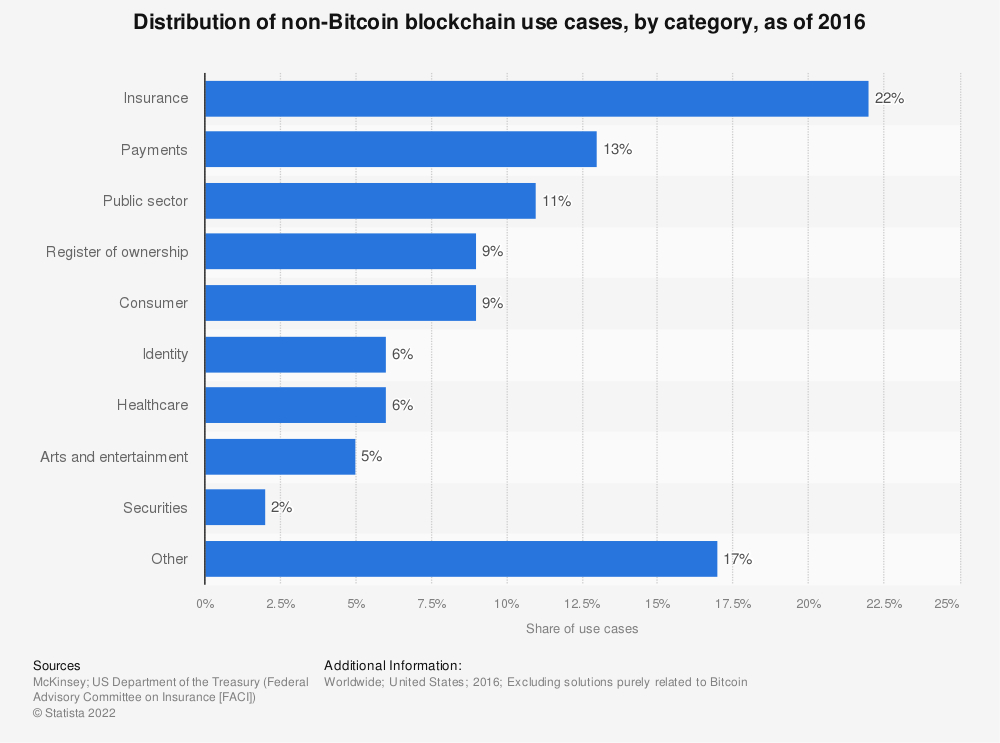
Source
Even education has recently started to regard blockchain principles and solutions as a serious crutch in teaching some disciplines (primarily mathematics).
It is true that blockchain, whose history goes back to 1991, got considerable traction less than fifteen years ago with the launch of Bitcoin as the first cryptocurrency. But since then, these two concepts have been moving distinctly apart, first of all in terms of popular attitude: while cryptocurrencies enjoy a rather checkered reputation across the business community, blockchain has a totally positive image among entrepreneurs. However, despite this difference, both realms have displayed an amazing spike in investments just within one year!
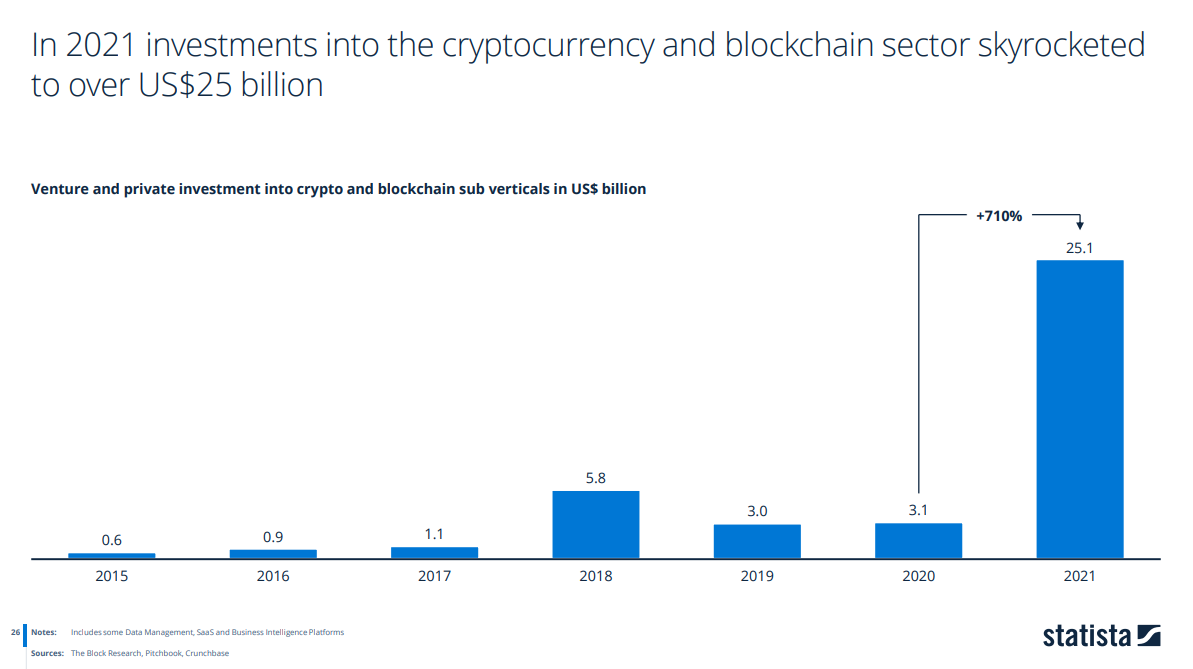
Source
Blue-chip companies (for instance, IBM, Facebook, Walmart, and Microsoft, to name a few) are trailblazers in this drive, with over 60% of them planning to invest not less than $1 million in blockchain-related projects any time soon. The World Economic Forum announced its expectations of 10% of global GDP to be stored with the employment of this technology within five years. So it is no wonder that global spending on blockchain solutions is envisaged to manifest an almost five-fold surge by 2024 and reach the exorbitant $19 billion. As a result, the distributed ledger market (and blockchain is part and parcel of it) with its top use cases is expected to grow apace in the foreseeable future.
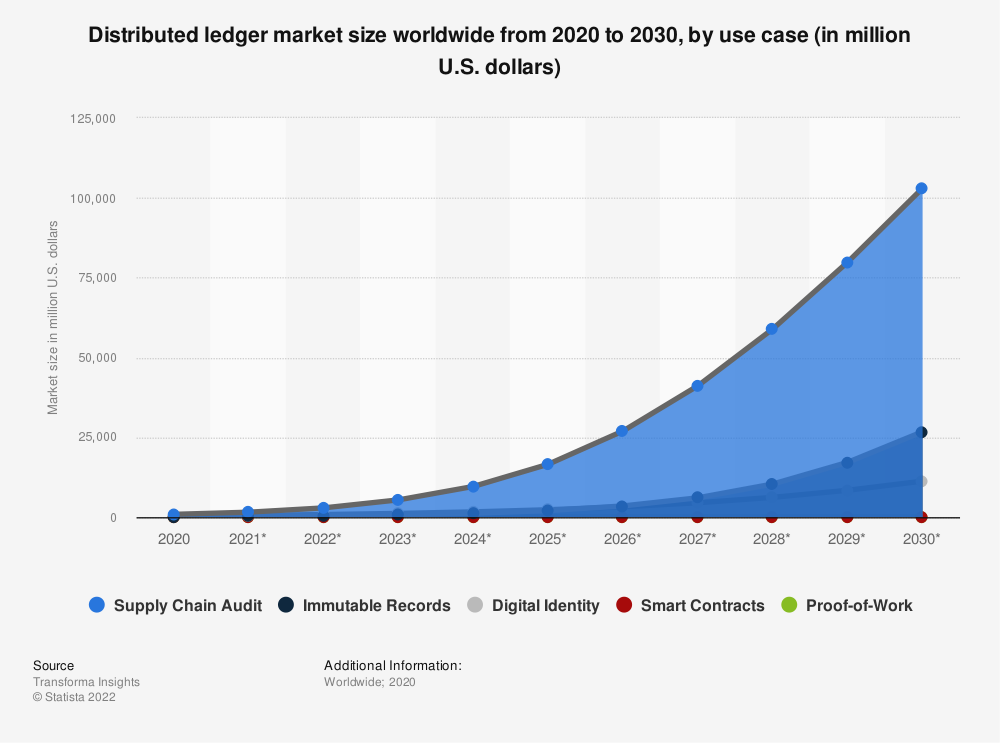
Source
Given such mouth-watering prospects of this high-tech field, it is natural that the IT world is experiencing a huge need for a competent workforce possessing blockchain expertise. However, the demand for these specialists dramatically exceeds the supply: in 2016, the global number of blockchain experts comprised a meager 5,000. Since that time, the talent pool has definitely grown, but two years ago, LinkedIn still put blockchain engineer skills at the top of most-wanted qualifications among software developers, and Glassdoor reported a 300% annual growth of blockchain job postings. Why is the interest in their services so intense?
The Role of the Blockchain Engineer Scrutinized
As a rule, blockchain specialists are recruited by technology or data consulting organizations to leverage the existing open-source know-how for the development and implementation of blockchain solutions. The latter are usually related to data structures and algorithms, computer networking, cryptography, or cryptocurrencies. To do that on an adequate level, they must be able to analyze the company's needs and organize asset and infrastructure setup processes, paying special attention to their security.
A conventional roster of responsibilities of a blockchain engineer includes:
- Researching material for a particular blockchain project.
- Preparing documentation for it.
- Troubleshooting and testing the developed solutions.
- Performing maintenance of their back-end and front-end elements.
- Designing decentralized apps (dApps) based on blockchain technology.
- Evaluating fully-implemented apps that are a part of the organization’s blockchain ecosystem and introducing the latest improvements in them.
- Developing solutions for a special blockchain platform (for instance, Ethereum or Hyperledger).
Companies that hire experts capable of performing such duties enjoy the following benefits:
- Streamlined workflow. The competent implementation of this technology simplifies and facilitates a fair share of pipeline processes and enhances the overall efficiency of the organization.
- Reduced costs. Since all internal mechanisms function more efficiently and the need for third-party intermediaries is eliminated, the company’s expenditures are significantly scaled down.
- Minimized fraud. Contrary to the apprehensions of abundant crime in the niche, the immutable nature of the distributed database blockchain relies on can considerably cut down on fraudulent activities within an enterprise.
- Augmented data security. Cryptography, as one of the cornerstones of blockchain, guarantees a high level of security, which makes it harder for cyber criminals to break through into the corporate system and burglarize sensitive or financial information.
The boons of hiring a blockchain engineer are more than evident. Now you have to realize what to look for in the candidates for this position.
Must-Have Skills for a Blockchain Engineer
There are three categories of expertise you must check while performing blockchain engineer screening. The first group of skills comprises general IT competencies.
1. Basic Programming Abilities
This is the foundation that will allow developers to learn more about any technology, including blockchain. Being highly professional in this field isn't required; understanding syntax and being able to write code is enough. The technical expertise that is highly welcome for a future blockchain engineer embraces:
- Object-oriented programming structure (OOPS) that allows updating the program when necessary.
- The most used programming languages (Java, JavaScript, Python, Solidity, C (C++), and Go).
- Multithreading implementation in apps of various types.
- Popular blockchain platforms.
2. Competence in Security and Encryption
This ability will enable the job candidate to build secure systems and applications. It involves:
- Familiarity with the major security protocols (Secure Socket Layer (SSL) and Transport Layer Security (TLS)).
- Proficiency in data encryption/decryption techniques and multi-factor authentication.
- Understanding public and private key concepts.
- Knowledge of basic networking concepts (routing, peer-to-peer networks, packet transferring, etc.)
- Awareness of Security Hash Algorithm. Namely, the difference between SHA-1 and SHA-2 and the ability to select a suitable feature for the solution.
3. Knowledge of Data Structures
These are the bedrock of any app, so qualified programmers, in addition to the skills of handling tree models, must have experience of working with:
- Linked lists. As the name gives away, this data organization pattern presents the structure where nodes are joined together. The model is ideal for small data sets that can thus be traversed in both directions (from the beginning with its head node to the end with its tail node and vice versa). The outcome is especially handy for searching and sorting algorithms.
- Singly-linked lists. This subtype refers to those lists where a node has only one reference (to the next node). Such a structure is employed when two-directional traversing of the list is less important than space efficiency.
- Hash tables. In them, it is easy to find and access necessary data due to the hash function. Such tables are instrumental in cases when you prioritize fast retrieval of data or random access to it.
- Acyclic (bipartite) graphs. They don’t contain any cycles and are primarily employed to model real-world issues.
A novel IT skill that is valued by employers is awareness of Big Data concepts (such as Hadoop and MapReduce) that will enable blockchain specialists to efficiently process huge amounts of information.
The second group of skills is associated with blockchain-specific expertise. Here belong competencies related to the following fundamentals.
1. Distributed Ledgers
The technology involves storing data across a network of multiple endpoints (computers) instead of hoarding it in one virtual venue. In this way, all blockchain participants can view any content of the ledger.
2. Consensus Mechanisms
Thanks to them, blockchain members can agree on the state of the ledger and add new pieces of data to it. The two most popular consensus mechanisms are proof of work (PoW) and proof of stake (PoS).
3. Smart Contracts
This is a business logic behind blockchain operations that exists as a piece of code. It enables to automatically perform agreements and transactions between parties without any intermediaries. Thus, they can transparently exchange money, property, shares, or other assets in a way that isn’t subject to editing or other modifications. A blockchain engineer should be able to write them using Truffle or Solidity.
4. Immutability
As mentioned above, data on the blockchain can’t be changed. Once added to it, it stays there for good. And to be added, a new event has to be created while all the previous information is edit-proof and delete-proof.
5. Sharding
In a blockchain, the network is divided into smaller chunks (shards) which makes it more manageable and improves the performance of databases where all nodes are connected. Thus, the transactions are first processed by a small portion of nodes and then scaled to the rest of the blockchain, which allows for the simultaneous handling of multiple transactions.
6. Public and Permissioned Blockchains
Public blockchains are permissionless and allow any person to join them and become a node there because they don’t have any central authority managing them. To join a permissioned blockchain, you need the approval of its governing body when you receive a specific key to operate with the data there. Every type has its upsides and downsides.
On the one hand, permissioned blockchains are more secure but less transparent since they depend on the decisions of a remote center. On the other hand, data on public blockchains are harder to tamper with, but it is also open to manipulation by third parties.
7. Tokens
These are digital assets that can be issued by any participant of the blockchain and are stored there. They represent money, property, or any other unit of value. Conventionally, a public blockchain has two types of tokens.
- Coins. They denote the ownership of a virtual asset and serve as a payment unit in transactions between members of the blockchain, much like fiat money does in the physical world.
- Fuel. This kind of virtual currency is used to pay mining fees.
8. dApps
This acronym stands for decentralized apps and denotes the kind of Ethereum-based applications that operate in the blockchain and are executed by its nodes.
The third group of skills required from a blockchain engineer is the expertise in leveraging special development tools, such as:
- Etherscan. This is a website that enables monitoring the blockchain, searching for transactions there, and checking address balances.
- Blockchain Explorer. Thanks to it, you can view the transaction, check the pending ones in a wallet address, and add new blocks to the network with an opportunity of monitoring their details.
- Composer. The tool is employed to build and manage blockchain apps via its features that include smart contract development, unit testing, and package management.
- Caliper. It gauges the performance of blockchain nodes, namely the speed of adding new blocks, port connection status, node synchronization, etc.
- Remix IDE. This development environment is used to write, test, and deploy smart contracts.
- Testnets. As you may guess, this is a testing tool for dApps that doesn’t make use of tokens.
If the applicant for the position of a blockchain engineer is going work with Ethereum, (s)he will also need to be proficient in the:
- Solidity, the programming language for writing smart contracts.
- Truffle, a development framework whose features allow to compile, test, and deploy smart contracts.
- Drizzle, a Python library for building dApps.
- Mist, a desktop wallet enabling operations with ether, whose in-built browser allows deploying dApps.
- Solo, a command-line tool that enables running nodes.
- Geth, that has the same mission as Solo but is also used as a repository of data that can initiate smart contract-powered transactions.
- MetaMask, that acts both as a browser extension enabling to run apps and a digital wallet used for storing and exchanging ether and tokens.
- Ganache, a personal Ethereum blockchain allowing to deploy smart contracts, create and manage test accounts, perform automated tests, etc.
Now you know what skills you should look for in a candidate for the position of blockchain engineer. The next step is to peruse the venues where you can find one.
Where to Look for Blockchain Engineers: A Concise Compass
The first dilemma for you to solve when you are poised to hire a blockchain engineer is whether to opt for in-house recruiting or outsourcing.
The first approach is mostly taken by large enterprises that can provide their in-house staff with a constant workload and pay them a regular salary. But it is totally unsuitable for small organizations and startups on short commons, which can't afford such a luxury and need the services of a blockchain engineer only occasionally for a one-off project. In such a case, outsourcing is just what the doctor ordered.
You can seek self-employed IT specialists at various freelance platforms like Upwork or Toptal. The headhunt can be much accelerated if the search is narrowed to specialized venues. To begin with, you can check blockchain expert communities (for instance, BitcoinTalk, Reddit, or StackExchange) and try to find suitable talent at niche conferences, such as Blockchain Expo, Bitcoin Miami, and LA Blockchain Summit.
However, not to let the search last indefinitely and eliminate the risk of falling in with unscrupulous rogues, it is wise to address blockchain marketplaces and job boards. A reliable marketplace will have a large pool of pre-vetted blockchain engineers (and other IT mavens) to offer who possess adequate competence and experience in the field you are going to employ them in.
Drawing a Bottomline
Being over thirty years old, blockchain technology is currently experiencing a boom and finds various applications across many industries. Despite the weighty boons, it can usher to organizations, qualified specialists in this niche are still not numerous and take time and effort to find. By addressing specialized marketplaces, you can get in touch with top-notch blockchain engineers who have the necessary expertise and are in command of the required tools to implement a blockchain project of any scope and complexity at a high level.
